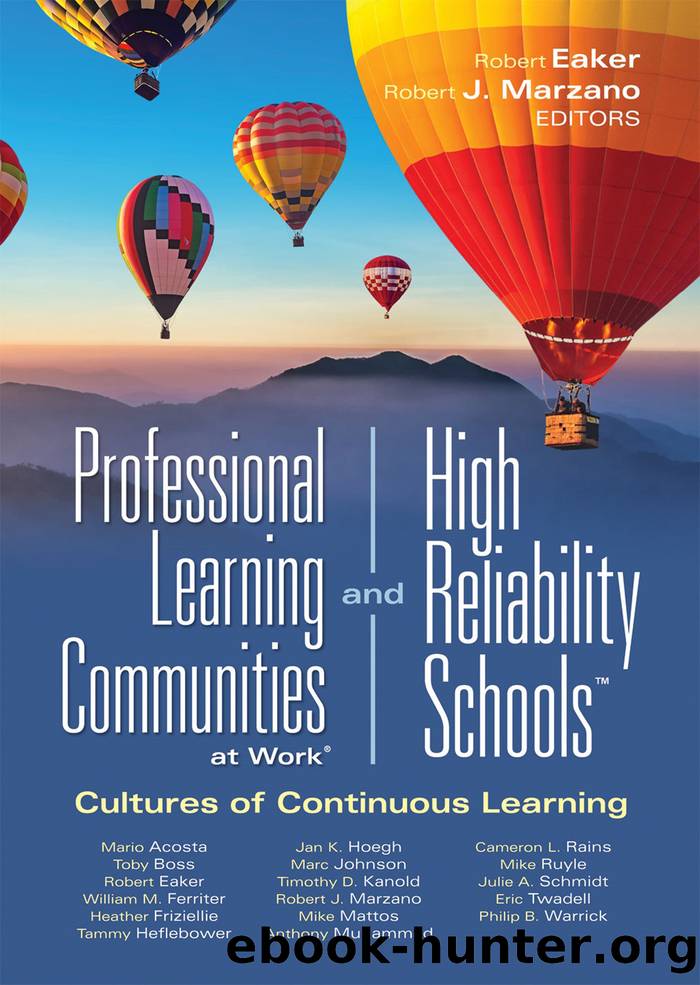Professional Learning Communities at Work®and High-Reliability Schools by Eaker Robert;Marzano Robert J.;

Author:Eaker, Robert;Marzano, Robert J.;
Language: eng
Format: epub
Publisher: Solution Tree
Published: 2020-09-15T00:00:00+00:00
Figure 8.2: Gradebook example.
While there is no doubt it is important to hold students responsible for their behavior, there are many, many alternatives to conflating grades as a reflection of achievement and improvement with grading for punishment and misbehavior.
The other side of the same coin, however, is using grades as reward. If, ideally, grades reflect improvement and achievement, then we must be willing to question the time-honored practice of giving extra credit. For example, a phenomenon occurs every December 1 in many northern U.S. states: loads of extra-credit points are doled out to students when they provide their teachers with ⦠boxes of tissues. If youâre a student of parents with a wholesale club membershipâjackpot! So the message we end up sending to students is simple: âCome to the football game on Friday night, clean off the whiteboard, or bring in tissues and you donât have to understand the periodic table or the causes of World War I. Youâll get extra credit and all will be OK.â To anyone even remotely familiar with the basic principles of PLCs, this is obviously a silly grading practice whose time has come and gone.
In The Learning Leader, Douglas Reeves (2006) states, âSimply put, letter grades do not reflect student achievement in an astounding number of cases.⦠When providing students with feedback ⦠[it] must take place within boundaries of fairness, mathematical accuracy, and effectivenessâ (p. 113). As an educator, if you donât agree that grades should be fair, accurate, and effective, then we probably need to sit down for a longer conversation than what this chapter can accomplish. Ultimately, we must acknowledge that traditional grading and reporting practices do not reflect learningâour fundamental purposeâwhich in a PLC must be the basis of all decision making.
Download
This site does not store any files on its server. We only index and link to content provided by other sites. Please contact the content providers to delete copyright contents if any and email us, we'll remove relevant links or contents immediately.
| ASVAB | GED |
| GRE | NCLEX |
| PRAXIS | SAT |
| See more | Flash Cards |
| Study Guides | Study Skills |
| Workbooks |
Talking to Strangers by Malcolm Gladwell(13370)
The Compound Effect by Darren Hardy(8965)
Tools of Titans by Timothy Ferriss(8393)
Wonder by R. J. Palacio(8109)
The Lover by Duras Marguerite(7901)
A Court of Wings and Ruin by Sarah J. Maas(7845)
The Circle by Dave Eggers(7114)
Deep Work by Cal Newport(7083)
Kaplan MCAT General Chemistry Review by Kaplan(6933)
To All the Boys I've Loved Before by Jenny Han(5848)
Wiseguy by Nicholas Pileggi(5783)
The Body: A Guide for Occupants by Bill Bryson(5096)
Eat That Frog! by Brian Tracy(4538)
1,001 ASVAB Practice Questions For Dummies by Powers Rod(4503)
Cracking the GRE Premium Edition with 6 Practice Tests, 2015 (Graduate School Test Preparation) by Princeton Review(4292)
Pre-Suasion: A Revolutionary Way to Influence and Persuade by Robert Cialdini(4232)
Barron's AP Biology by Goldberg M.S. Deborah T(4150)
ACT Math For Dummies by Zegarelli Mark(4047)
Alive: The Story of the Andes Survivors by Piers Paul Read(4031)
